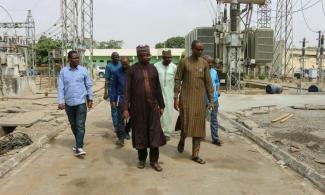
"However, right now, I can tell you that we have reached the whole country and up to Niger and Cotonou but still at that, I can tell you that we are not at the normal state yet. Usually, it takes about 24 hours for us to reach the normal state. Since I came as the MD of TCN, the system instability recorded in those two days was the worst.

Usman Mohammed, Managing Director/Chief Executive Officer, Transmission Company of Nigeria, has said that before the country can have a stable electricity grid power distribution companies have to recapitalise.
In an interview with The Punch on Sunday, Mohammed said that they have always maintained that there must be a commensurate investment in the distribution network if the nation is going to achieve grid stability.
He said, "electricity is driven by protection. If you take your house as an instance, there is always what you call cut-out or MCB and the intention in installing this equipment is to isolate faults inside the house and prevent such faults from entering the grid.
"If the fault inside the house is not shielded, it will enter the substation. If the substation is not shielded, it will go into the injection substation. From the injection substation, if it is not protected, it will go into the transmission station. And that is what is often happening to our transmission stations.
"So we cannot have a stable grid unless we have an adequate investment on the distribution side and that is why we have been calling (as transmission company) for distribution to be recapitalised. They (distribution companies) need to have a commensurate investment on the network.
"So, on whether we are protecting our systems; of course, we are doing that. However, grid stability also requires that you are meant to be expanding and as you do this you must ensure that it complies with the desire to make the grid stable. This expansion should include the connection of the grid through SCADA as well as a commensurate increase of the spinning reserve.
Speaking on the recent collapse of grid that put the country to total black out for two days, Mohammed said the issue dragged on for two days because the process of restoring a grid takes time.
The TCN boss said, "we have reached the whole country but I cannot tell that we are at the stage where one can say the grid is stable. This is because as we restore supply to a particular place, distribution also has to pick the load and these activities are done gradually. When we are restoring supply after a system collapse, we also don’t allow them to pick the load all of a sudden because the generators are coming in gradually.
"However, right now, I can tell you that we have reached the whole country and up to Niger and Cotonou but still at that, I can tell you that we are not at the normal state yet. Usually, it takes about 24 hours for us to reach the normal state. Since I came as the MD of TCN, the system instability recorded in those two days was the worst.
This is because there was no time that we had system instability where the restoration took a long time like that. And the reason was that we had a high voltage caused by the fact that electricity load was being rejected by the Discos. And the load was not being picked by the distributors because of weak distribution network. So, that is the reason for that instability.
"It is also important to let you know that the management of the grid became very difficult at a point in time during that recent incident because the voltage became very high. In fact, in the process of restoration, we got to a point where we had to bring down the grid ourselves because we discovered that if we didn’t do that there won’t be enough time to tell the generators to drop their load. And if we had left this for long, we would have recorded multiple explosions and our equipment would have given way.
That was the reason why at a point we had to bring down the grid. And even at that, we recorded explosions in Shiroro and Jos. So, this means that if we had allowed it to stay longer, there would have been fire all over the place."